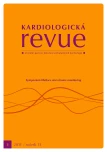-
Medical journals
- Career
Chronic cardiac failure with non-compact cardiomyopathy in a middle-aged woman
Authors: J. Leso 1; T. Paleček 2
Authors‘ workplace: Kardiologická ordinace, Městská nemocnice následné péče, Praha 1; II. Interní klinika kardiologie a angiologie, Všeobecná fakultní nemocnice, 1. LF UK Praha 2
Published in: Kardiol Rev Int Med 2011, 13(3): 193-197
Category: Case Report
Overview
The authors present a case report of a female patient who was monitored for a period of 11 years from the “innocent“ beginnings until the clear morphological manifestation of a left ventricular non-compaction cardiomyopathy with systolic dysfunction, which was preceded by a working diagnosis of idiopathic dilated cardiomyopathy. The unfavourable development of chronic cardiac failure was reversed by decreasing the heart rate using ivabradine.
Keywords:
chronic heart failure – non-compaction cardiomyopathy – heart rate – ivabradine
Sources
1. Kantor PF, Lucien A, Kozak R et al. The antianginal drug trimetazidine shifts cardiac energy metabolism from fatty acid oxidation to glucose oxidation by inhibiting mitochondrial long-chain 3-ketoacyl coenzyme A thiolase. Circ Res 2000; 86 : 580–588.
2. Pharmakokinetics of ivabradine. Summary of Product Characteristic. London, UK: EMEA, October 25, 2005.
3. Mulder O, Barbier S, Chagraoui A et al. Long-term heart rate reduction induced by the selective I(f) current inhibitor ivabradine improves left ventricle function and intrinsic myocardial structure in congestive heart failure. Circulation 2004; 109 : 1674–1679.
4. Ganame J, Ayres NA, Pignateli RH. Left ventricular noncompaction, a recently recognized form of cardiomyopathy. Insuf Cardiaca 2006; 3 : 119–124.
5. Sarma RJ, Chana A, Elkayam U. Left ventricular noncompaction. Prog Cardiovasc Dis 2010; 52 : 264–273.
6. Wikstrand J, Hjalmarson A, Waagstein F et al. MERIT-HF Study Group. Dose of metoprolol CR/XL and clinical outcome in patiens with heart failure: analysis of the experience in metoprolol CR/XL randomized intervention trial in chronic heart failure (MERIT-HF). J Am Coll Cardiol 2002; 40 : 491–498.
7. Lechat P, Hulot JS, Escolano S et al. Heart rate and cardiac rythm relationships with bisoprolol benefit in chronic heart failure in CIBIS II Trial. Circulation 2001; 103 : 1428–1433.
8. Packe M, Bristol MR, Cohn JN et al. The effect of carvedilol on morbidity and mortality in patients with chronic heart failure. U.S. Carvedilol Heart Failure Study Group. N Engl J Med 1996; 334 : 1349–1355.
9. DiFrancesco D. If current inhibitors: properties of drug-channel interaction. In: Fox K (ed.). Selective and specific If channel inhibition in cardiology. London, UK: Science Press 2004 : 1–13.
10. Colin P, Ghaleh B, Monnet X et al. Contributions of heart rate and contractility to myocardial oxygen balance during exercise. Am J Physiol Heart Circ Physiol 2003; 284: H676–H682.
11. Jondeau G, Korewicki J, Vasiliauskas D. Effect of ivabradine in patiens with left ventricular systolic dysfunction and coronary heart disease. Eur Heart J 2004; 25 (Suppl): 451.
12. Jondeau G, Bohm M, Tavazzi L et al. Hemodynamic effect of ivabradin, a pure heart rate lowering agent, in patiens with severe systolic chronic heart failure receiving betablockers. Eur J Heart Failure Suppl 2008; 7 (Suppl 1).
13. Cerbai E, Pino R, Porciatti F et al. Characterization of repolarization-activated current, I(f), in ventricular myocytes from human failing heart. Circulation 1997; 95 : 568–571.
14. Swedberg K, Komajda M, Böhm M et al. SHIFT Investigators. Ivabradine and outcomes in chronic heart failure (SHIFT): a randomised placebo-controlled study. Lancet 2010; 376 : 875–885.
15. Böhm M, Swedberg K, Komajda M et al. SHIFT Investigators. Heart rate as a risk factor in chronic heart failure (SHIFT): the associaton between heart rate and outcomes in a randomised placebo-controlled trial. Lancet 2010; 376 : 886–894.
Labels
Paediatric cardiology Internal medicine Cardiac surgery Cardiology
Article was published inCardiology Review

2011 Issue 3-
All articles in this issue
- Antiarythmic treatment from the point of view of recent recommendations for the treatment of patients with atrial fibrillations
- Non-pharmacological treatment from the point of view of recent recommendations for the treatment of patients with atrial fibrillation
- Antithrombotic treatment from the point of view of new guidelines for the management of atrial fibrillation
- Upstream therapy of atrial fibrillation
- Home monitoring of patients with atrial fibrillation
- Home monitoring and implants
- Telemonitoring of blood pressure in patients with arterial hypertension
- Chronic cardiac failure with non-compact cardiomyopathy in a middle-aged woman
- Cardiology Review
- Journal archive
- Current issue
- Online only
- About the journal
Most read in this issue- Antiarythmic treatment from the point of view of recent recommendations for the treatment of patients with atrial fibrillations
- Chronic cardiac failure with non-compact cardiomyopathy in a middle-aged woman
- Antithrombotic treatment from the point of view of new guidelines for the management of atrial fibrillation
- Home monitoring and implants
Login#ADS_BOTTOM_SCRIPTS#Forgotten passwordEnter the email address that you registered with. We will send you instructions on how to set a new password.
- Career

